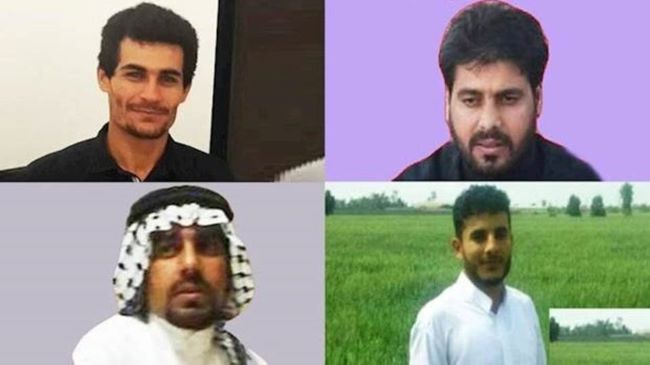Iran executed four political prisoners from the Ahvazi Arab minority on Sunday, February 28, 2021, in Sepidar prison, Ahvaz, Khuzestan Province.
They have been named as Naser Khafajian, Ali Khasraji, Hossein Silawi and Jasem Heidary.
Shortly before their deaths, their families were contacted by Intelligence Ministry agents and taken to Ahvaz’s Chaharshir Square, where they were blindfolded and taken to the prison where they were permitted a 30-minute visit with their loved ones. The families reported that the four were led out in handcuffs and shackles, which is when they told their families that they would be executed.
The authorities denied this, saying instead that the four were being moved to Sheiban Prison, but the families waited outside the prison for a little longer, which is when they saw their children’s executed bodies being carried out, which is when authorities confirmed the news.
Khasraji, Silawi, and Heidary had gone on hunger strike in January, even sewing their lips shut, to protest prison conditions, being denied family visits, and the continued threat of execution. (Ahvazi Arab prisoner Ali Motairi was also on hunger strike and was executed on January 28, despite a lack of due process, including torture. His family were not granted a final visit.)
Khafajian had been forcibly disappeared since April 2020, with no-one sure of his whereabouts.
Khafajian, Khasraji, and Silawi were given the death penalty by the Ahvaz Revolutionary Court in connection with a 2017 attack on an Ahvaz police station, which left two law enforcement officials dead.
They were held in solitary confinement in an Intelligence Ministry detention centre for months, denied access to their families and their lawyers, and, according to informed sources, subjected to torture, including the breaking of bones, until they “confessed” on TV.
All three were forcibly disappeared in April 2020 after being moved to an undisclosed location, but Silawi and Khasraji were transferred back in November. Someone who saw them at the time, described them as “severely injured” with gunshot wounds that destroyed Silawi’s elbow and denied medical treatment for their injuries that turned into infections.
Heidary was arrested in December 2017, after arriving back in the country from Austria, where he had refugee status. The 31-year-old was taken to Evin Prison where he was tortured into making “confessions” by prison authorities, as a result of which, he was confined to a wheelchair for some time. His mother, Marzieh, was also arrested in March 2018 to increase pressure on him.
He was sentenced to death in November 2020 for “cooperation with opposition groups”.
Iran Human Rights Monitor condemned the executions and called on the United Nations Security Council, Secretary-General, High Commissioner for human rights, Human Rights Council, and the European Union, to save the lives of death row prisoners and establish an international fact-finding mission to visit Iranian prisons.
